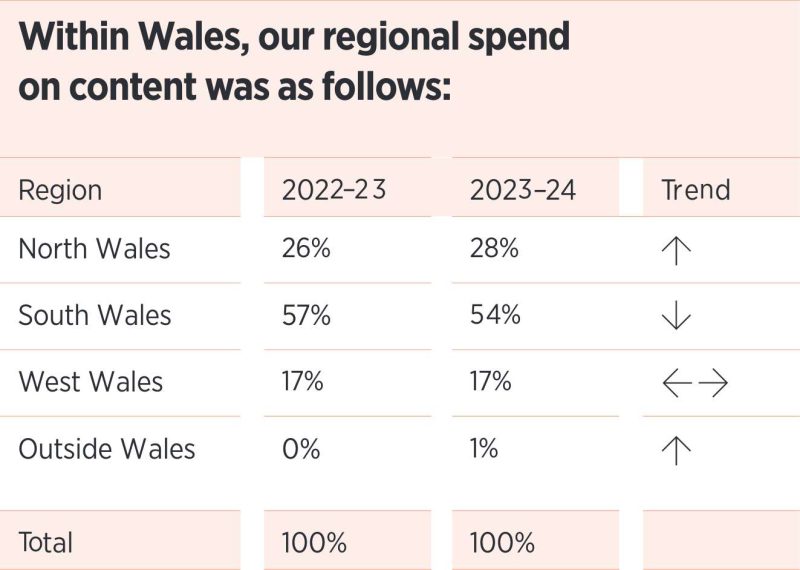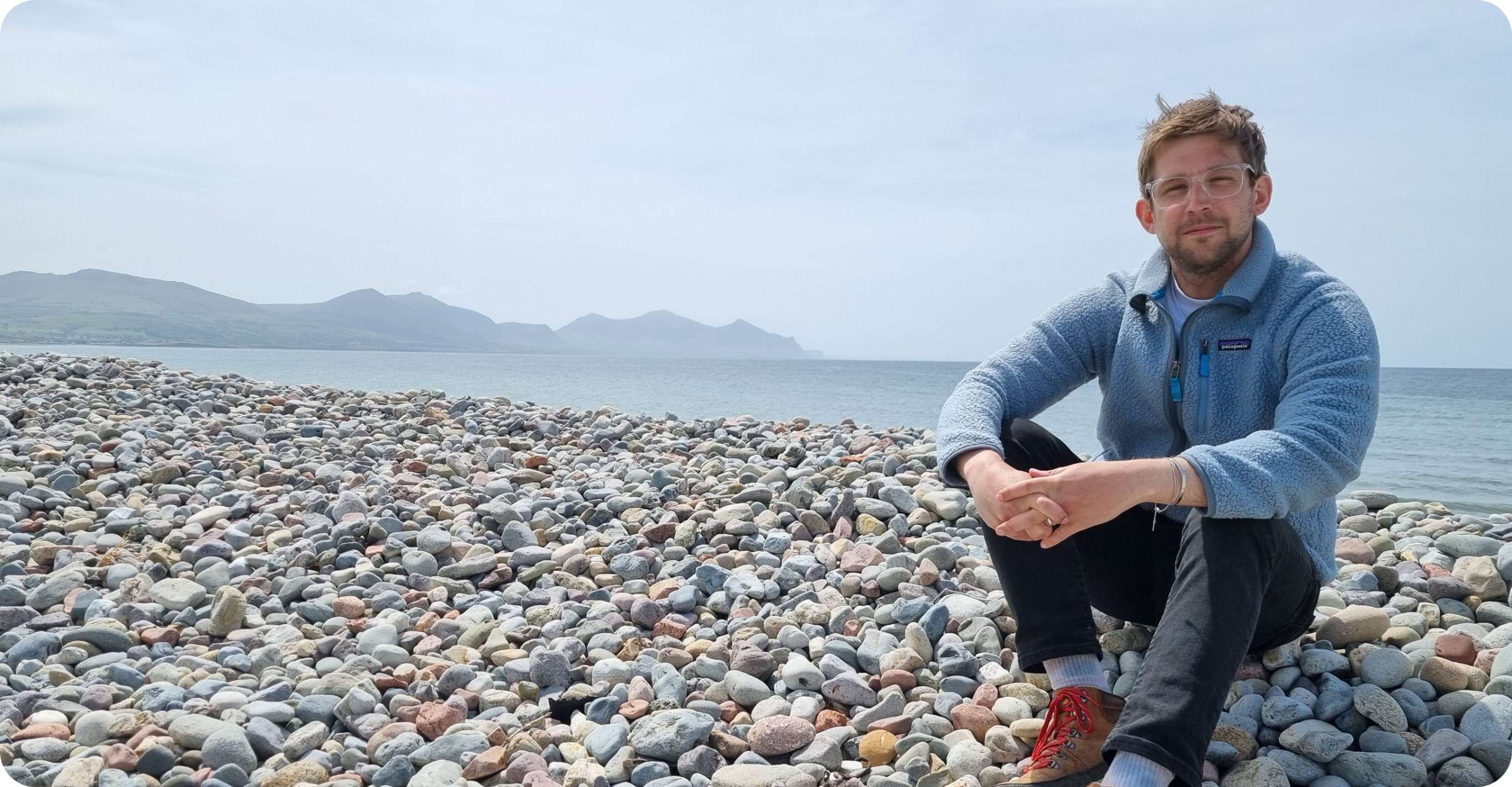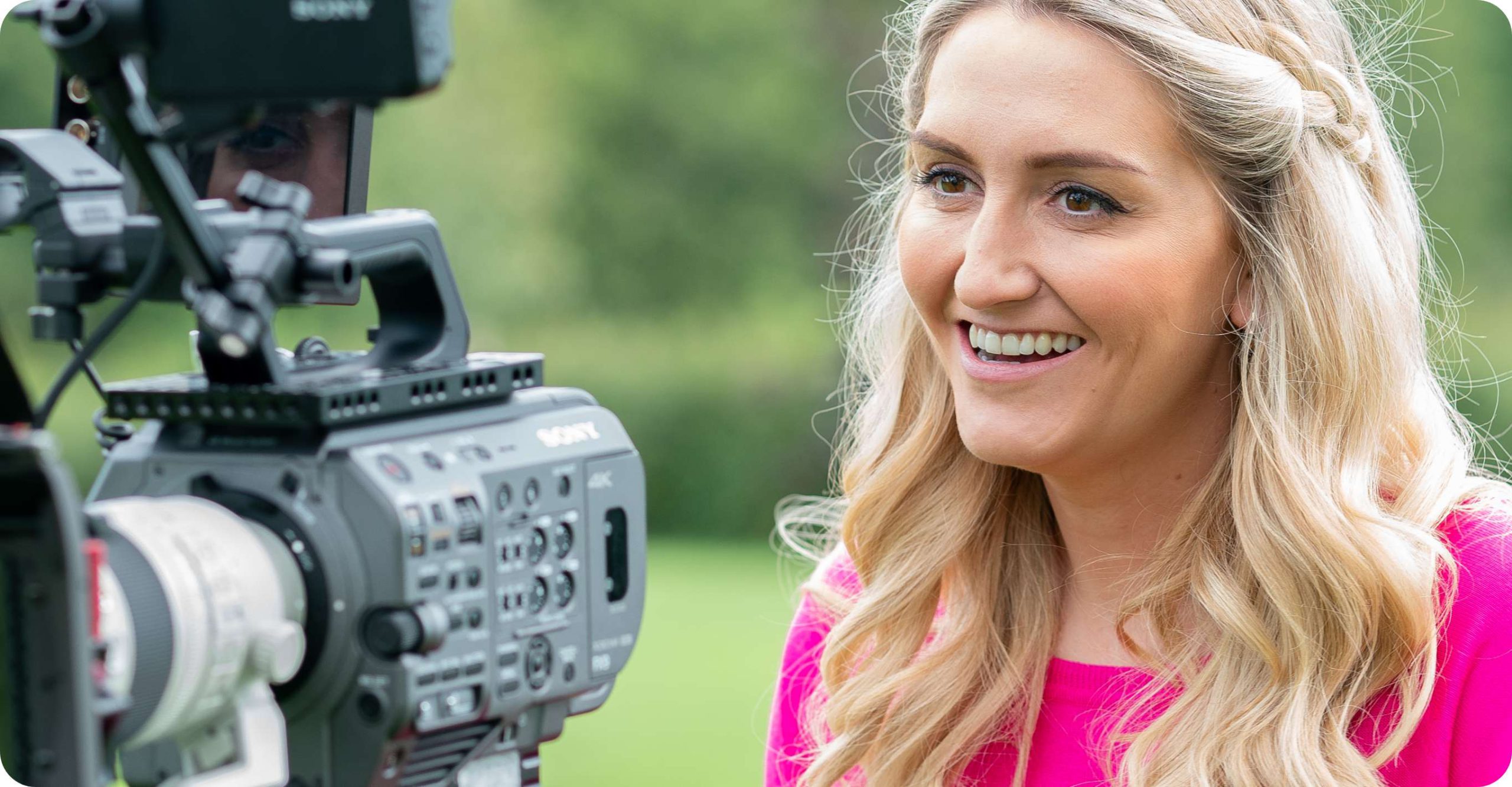Increase the numbers engaging with S4C’s content in Welsh, to help reach the million (and double the daily usage)
As a public service broadcaster, we have an important role and responsibility as a facilitator and enabler, using our resources to maximise the benefits to our viewers and to society more widely.
By working with a range of partners, we are working hard to contribute to the future of the Welsh language, culture, environment and economy.
Policy Statement
In December 2022, the S4C Board approved a policy statement that brings together S4C’s existing activities in terms of social and economic contribution.
This policy statement aligns with the 2022–27 corporate strategy approved in March 2022, and the policy priorities reflect elements of the corporate strategy – which underlines how S4C’s social and economic contribution is at the heart of the organisation’s wider activities.
S4C’s Social Purpose: To ensure that the Welsh language is part of everyone’s life in Wales
Increase the numbers engaging with S4C’s content in Welsh, to help reach the million (and double the daily usage)
Reflect Welsh communities by setting clear diversity targets, both internally and across our productions
Create value through our resources to support the local economy; and in doing so, to work towards reducing the carbon footprint of all our activities
Use our resources and influence to develop talent within S4C and the wider sector, as well as to support skills development
The post of Diversity, Sustainability and Social Purpose Leader was created in mid–2023. Among the responsibilities of the Leader is to lead S4C’s activities within this new policy statement, and to develop relevant strategies as necessary.
“The Welsh language belongs to us all”
Since 1982, the Welsh language has been central to the existence of S4C and a key focus for all its provision. The vital role S4C plays in maintaining and promoting the Welsh language is at the heart of its unique public purpose, and this was formalised as S4C received confirmation of its Licence Fee settlement from April 2022 onwards.
We now have a significant contribution to offer towards realising the objectives of the Welsh Government’s strategy ‘Cymraeg 2050: a million Welsh speakers’, namely: to increase the number of Welsh speakers, to increase the use of the Welsh language and to create favourable conditions to ensure the Welsh language flourishes. A Memorandum of Understanding signed by S4C and the Welsh Government’s Cymraeg 2050 unit in February 2023 formalises this contribution.
We are therefore – through our content – seeking to facilitate access to and use of the Welsh language for everyone of all ages and linguistic abilities. To achieve these objectives, in 2023 we made two key appointments, namely the Welsh Language Strategy Lead, and the Education Content Executive.
This is particularly important in relation to education, and we are working with key partners to develop educational content to support the curriculum in Wales and to ensure that S4C content can be used by learners – whatever their age.
S4C offers a range of Welsh-language content for children and young people – offering both entertainment and education, and in doing so our content plays an important role in normalising the Welsh language in everyday life. For example, content such as Cywion Bach (Boom Cymru) and Ne-wff-ion (Ceidiog) provide a fun and accessible way of learning about the world in Welsh.
It is vital that Welsh speakers of all linguistic abilities choose to watch S4C content regularly. For that reason, we are committed to offering lively and exciting content across a range of genres to entertain our audience, and ensure that the Welsh language is part of day-to-day life.
Additionally, S4C supports employment in areas with high proportions of Welsh speakers – within S4C and the wider production sector in Wales; thereby enabling a contribution to Welsh-language activities and maintaining the social and cultural fabric of these areas.

Reflecting Wales in all its diversity
It is essential that S4C portrays and celebrates Wales in all its diversity and working towards this remains a priority for S4C. The audience sees this as an important aspect of S4C’s work.
71% of viewers who speak Welsh consider S4C to be a channel that successfully reflected the people of Wales in all its diversity during 2023–24. In the same survey the previous year, the comparable figure was 68% (Source: S4C Image Tracking Survey, Beaufort Research, 2024).
In order for S4C to continue to serve and grow its audience, as well as contribute to a strong broadcasting sector, the long-term commitment to ensure that representation on and behind the cameras continues and is crucial.
We are therefore working with the production sector to ensure that our content reflects our communities in all their diversity.
A key element of this was the slate of content we broadcast to mark Black History Month in October 2023, when S4C offered varied content such as Sage Todz: Y Neges nid yr Iaith (Afanti), Taith i Gaeredin (Ride it Out), Windrush: Rhwng Dau Fyd (Tinopolis), a Dom a Lloyd: Cymru Heddiw (Carlam).
A similar approach was adopted to mark Disability History Month in November and December 2023. Highights from S4C’s special content included Y Frwydr: Stori Anabledd (Cardiff Productions), Bwmp (Octagon), and Bex: Stori Efan (Ceidiog).
Feedback on how S4C’s content is succeeding to reflect Wales in all its diversity is also obtained via the Diversity Panels which have been established by the Diversity, Sustainability and Social Purpose Leader. To date, panels on diversity and disability have been established. Their memberships include representatives from sector bodies, as well as key talent from the relevant protected groups.
S4C has also joined the Diamond system which is co-ordinated by the Creative Diversity Network. This is the system established by a number of leading UK broadcasters to collect consistent diversity and representation data on the programmes they commission. In adopting this system, S4C’s intention is to increase diversity on and behind the screen in the content of S4C in order to reflect Wales today.
As well as taking steps to ensure that our content reflects Wales in all its diversity, we are also working to increase diversity, equality and inclusion across our corporate activities. In October 2023, diversity training was provided to all S4C staff. New initiatives have also been introduced to increase and improve awareness of various under-represented and groups with protected characteristics.

Creating Value Sustainably
Alongside our social contribution, S4C is making a significant contribution to the Welsh economy.
Over 77% of S4C’s public funding is invested in programming and content. This represents investment in the services provided to the audience and in the production sector in Wales.
We invest and commission our content from production companies across Wales and our supply chain companies in turn play an important role in their local economies.
We are also keen to support the sector to develop, and assist companies to realise their potential. This in turn will strengthen our supply chain. The steps we have taken so far include facilitating more collaboration between the larger and smaller companies – such as by encouraging the use of production equipment and resources by smaller companies when they are not required by the larger companies that own them.
At the same time, S4C’s commercial strategy aims to contribute to Wales’ economic prosperity by, amongst other objectives, using its growth fund to invest in companies with potential to grow, and which align with S4C’s purpose.
Taken together, all this activity therefore means that S4C’s contribution to the Welsh economy is substantial – and it is important that this contribution is felt across Wales.
Our objective is to spend over 95% of our content budget with producers based in Wales. In 2023–24, we succeeded in spending 99% of the content budget within Wales (2022–23: 100%).

(The above data relates to the location of the production company offices, and does not reflect production activity or expenditure in locations across Wales. We undertook a detailed review of the relevant locations for each production during the course of 2023–24 – the data provided above reflects the outcome of that review, and the figures for 2022–23 have been recast to provide an accurate comparison.)
Of course, in supporting and investing in the economic growth of Wales, S4C is acutely aware of the need to do so in an environmentally sustainable way.
Since September 2021, S4C has partnered with the BAFTA albert consortium – which brings together some of the UK’s largest broadcasters and production companies – to achieve this, and to incorporate sustainability into our production process by:
On 01 January 2022, it became mandatory for companies producing content for S4C to comply with the above requirements (unless the production is a series under 15 minutes long and / or the total budget is less than £50,000).
As a result of our partnership with albert, S4C was one of 12 broadcasters and streamers who came together in November 2021 to sign up to the Climate Content Pledge, organised by albert. This was the first time the industry has worked together on such a statement.
S4C and other signatories – including the BBC, BBC Studios, BritBox International, Channel 4, Channel 5 / ViacomCBS, Discovery UK and Eire, ITV, RTE, Sky, STV, and UKTV – are committed to using our content to help audiences understand what tackling climate change could mean for them, as well as informing and inspiring sustainable choices.
Off screen, S4C is working to reduce the impact of our corporate activities on the environment. In recent years, we have taken steps to reduce unnecessary travel and increase the use of video conferencing. The use of public transport is encouraged as much as possible.
Our aim is to further reduce the environmental impact of our corporate activities over the coming years, and ultimately agree a target date to complete the transition to net zero carbon-based operation.

Developing Talent
Since the very beginning, S4C has played a crucial role in developing talent and skills within the sector in Wales.
The nature of S4C’s commissioning as a non-content creating broadcaster has enabled our content partners to invest in the skills development of their staff over the years – and S4C itself continues to invest and lead the way to support this aim.
Supporting people from all backgrounds to come to work in the sector is also a priority for S4C. We are therefore pleased to have continued to work with partners such as It’s My Shout, Screen Alliance Wales and Careers Wales during the reporting period to realise this, and to have been involved in the RAD Cymru Wales pilot – a paid training scheme for those from under-represented backgrounds.
Alongside Creative Wales and other broadcasters, S4C is also a key supporter of Fast Track Wales – a development programme to accelerate the careers of unscripted producers through paid placements, commissioning insight, training and commissioning and industry mentoring.
We have also formalised our partnership with Sgil Cymru, and jointly invested with Creative Wales in the Criw scheme to enable more apprentice opportunities on S4C productions.
All these activities help us to maintain a highly skilled workforce that underpins a world-class production sector in Wales and attracts TV production, film and digital content from around the world.

Evaluating S4C’s Social and Economic Contribution
In approving the policy statement on S4C’s Social and Economic Contribution, the S4C Board committed to commissioning an assessment of S4C’s economic and social impact every two years, to ensure an independent evaluation of that impact.
During spring 2023, Wavehill was appointed to undertake an independent evaluation of S4C’s economic and social impact for the 2022–23 financial year. Wavehill reported their initial findings to the S4C Board in autumn 2023, prior to their resulting report being published in April 2024.
In their independent report, Wavehill found that “S4C has a significant footprint within and across local communities across Wales in their role as an employer, commissioner and anchor institution within the Welsh media industry”.
The key findings outlined in Wavehill’s report included:
A Local Employer of High Quality Jobs
S4C employs 118 full time equivalent (FTE) high quality and well-paid jobs, primarily in Cardiff, Carmarthenshire, Gwynedd and Ceredigion. Over half of these jobs are based in relatively deprived areas with average earnings below the Welsh and UK averages.
Significant Contributor to the Welsh and UK Economy
Through its day-to-day operations, supply chain spend and salaries, and visitor impact, S4C’s activities in 2022–23 are estimated to have supported 1,900 FTE jobs and generated £135.6m in GVA in Wales. This impact rises to 2,300 jobs and £157.2m in GVA across the UK. This implies that just over 1 in every 7.6 jobs in Wales’ ‘Film, TV, Radio, and Music’ sub-sector is supported by S4C; and that its total Wales GVA contribution is equivalent to 42% of Wales’ ‘Film, TV, Radio, and Music’ sub-sector and 0.2% of Wales’ total GVA in 2022.
Cost Efficient and Value for Money
Not only is S4C one of the most cost-efficient PSBs in the UK with a cost per hour significantly lower than other broadcasters but its activities generate tax revenue that exceeds the funds it receives – for every £1 pound of license fee funding received by S4C, £1.02 is generated in tax for HM Treasury.
A Good Return on Investment
For every £1 of license fee funding received by S4C, the broadcaster generated £1.53 in GVA in Wales, rising to £1.77 for the UK.
Champion and Nurture Talent
Through its own influence and strategic partnerships with organisations like TAC, Screen Alliance Wales, Creative Wales, the BBC, and ITV, S4C plays a pivotal role in fostering and guiding the training and apprenticeships landscape of Wales’ cultural sector. S4C actively encourages both Continuous Professional Development (CPD) and apprenticeships, not only to support the current workforce but also to cultivate new talent through supporting young people into the industry, ensuring a robust and skilled creative sector in Wales for the future.
Prominent Figure in the Welsh Business Community
In 2022–23, S4C spent over £104.5 million with 977 suppliers spanning 47 distinct sectors. These suppliers ranged from content producers to office suppliers to marketing firms. Three out of every four pounds were directed to suppliers headquartered or based in Wales. Of the £78.6m spent in Wales, more than half were to suppliers located outside of Cardiff.
Enabling a Welsh Language Economy
When surveyed, S4C’s direct suppliers noted that speaking Welsh was an essential skill for 75% of their employees.
Well-being of Future Generations
S4C is committed to providing social value from its activities including production, promotion and programming for its audiences, local communities and the people of Wales. The company’s social impacts align with and contribute directly to all seven well-being goals in Welsh Government’s Well-being of Future Generations Act.
The S4C Board intends to commission Wavehill to repeat their independent assessment during 2025, drawing on data for the 2024–25 reporting year, thereby providing an opportunity to evaluate S4C’s success in further enhancing its social and economic contribution.